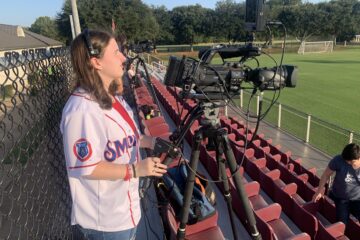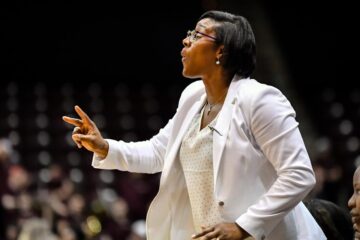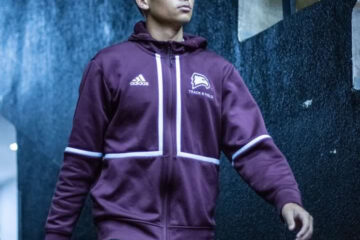With protocols in place to prevent the spread of COVID-19, NFL coaches, players and some fans made their way back into stadiums last month. Just as it looked like things were going great, the Tennessee Titans suspended in-person activities after reporting eight positive coronavirus tests among players and staff.
That total increased to more than 20 over the next two weeks as the team had to cancel its Week 4 matchup on Oct. 4 against the Pittsburgh Steelers, leaving many wondering if the National Football League had failed to take the steps necessary to safely complete a full season.
“I would say that with their protocols, they are doing as well as they can,” said Dr. Lauren McCoy, Assistant Professor of Sport Management and Program Director of Sport and Fitness Administration at Winthrop.
“Unfortunately when you’re talking about compliance with these things, it really depends on how well you get buy-in with them, and I think that’s why the NFL has added some strict requirements to do that,” she said.
McCoy, who specializes in sport law, noted that before the Titans’ outbreak, players were being approved for game day based on their positive test the day before. Since then, players are being tested every day.
“I think it’s beneficial that this is a growing and changing policy – that they’re kind of updating it based on what’s going on – but in terms of compliance, it’s the same problems that you see with college football and other sports that are trying to work right now that are not in that strongly controlled bubble environment,” McCoy said. “Your buy-in only works as well as people are willing to make it work.”
This past week, the Carolina Panthers entered the NFL’s intensive protocol after learning that a player on the Atlanta Falcons’ roster had tested positive for COVID-19 days after the two teams played each other. The Panthers were still able to hold in-person practice, but players were required to wear masks or face shields.
“One of the things that’s really good about the NFL is every player, staff member, et cetera, they have a bracelet that they’re all wearing that tracks their contact, so you can have somebody who is not necessarily in close contact with a lot of people test positive, and then you can use that bracelet to be able to track who’s doing what,” McCoy said.
McCoy noted that her favorite team, the Chiefs, had experienced no setback despite Stephon Gilmore of the New England Patriots testing positive a day after playing in Kansas City. Gilmore, who attended South Pointe High School in Rock Hill, was seen hugging Chiefs quarterback Patrick Mahomes at the conclusion of their Monday night game on Oct. 5. Mahomes did not test positive following the close contact.
The Chiefs were also one of the first teams in the NFL to welcome fans back, allowing Arrowhead Stadium to reach 22% capacity. While most stadiums began the season with a no-fan policy, many teams have started allowing reduced amounts of people to fill their seats.
The Panthers played their first home game in an empty stadium, but were able to host a little over 5,000 fans for their second home game after North Carolina governor Roy Cooper announced that he would allow venues with a seating capacity of over 10,000 to reach 7% capacity.
McCoy said that since stadiums have put additional safety measures in place, fans would have a hard time holding anyone but themselves liable if they contract COVID-19.
“Particularly since they do have these protocols in place, and if people are just straight up ignoring them, they’re assuming the risk of contracting the virus because of that,” she said.
McCoy also said that there was no way to ensure people would keep their masks on at a football game, citing the college football game between Texas and Oklahoma two weekends ago that featured a non-socially distanced Texas student section.
“It’s one of those things where I wouldn’t necessarily say it’s dangerous, especially because we do have a lot of people who are recovering from the virus no problem, but right now we don’t know the long term effects, we don’t know really what this could do.”
McCoy said it is important to remember all of the risks involved, which go further than just the stadium on game days.
“We need to consider not only protecting in terms of people being safe on the field, but say for example we have these players who are away from their families and then they bring this to their family. That is a concern that we have to have,” she said.
“Caution is a great thing to have right now, even though it might feel like it’s overly abundant,” McCoy said. “From my perspective, it’s better to be cautious and then not need those cautions than to be under cautious and you obviously needed all of those concerns.”
While all teams have returned to play at this time, it remains to be seen how the NFL will go about rescheduling games should more teams have to cancel matches. The possibility of adding an additional week onto the end of the regular season and postponing the playoffs currently seems like the most likely scenario if the NFL is not able to maintain its schedule.
Graphic by Katelyn Miller




